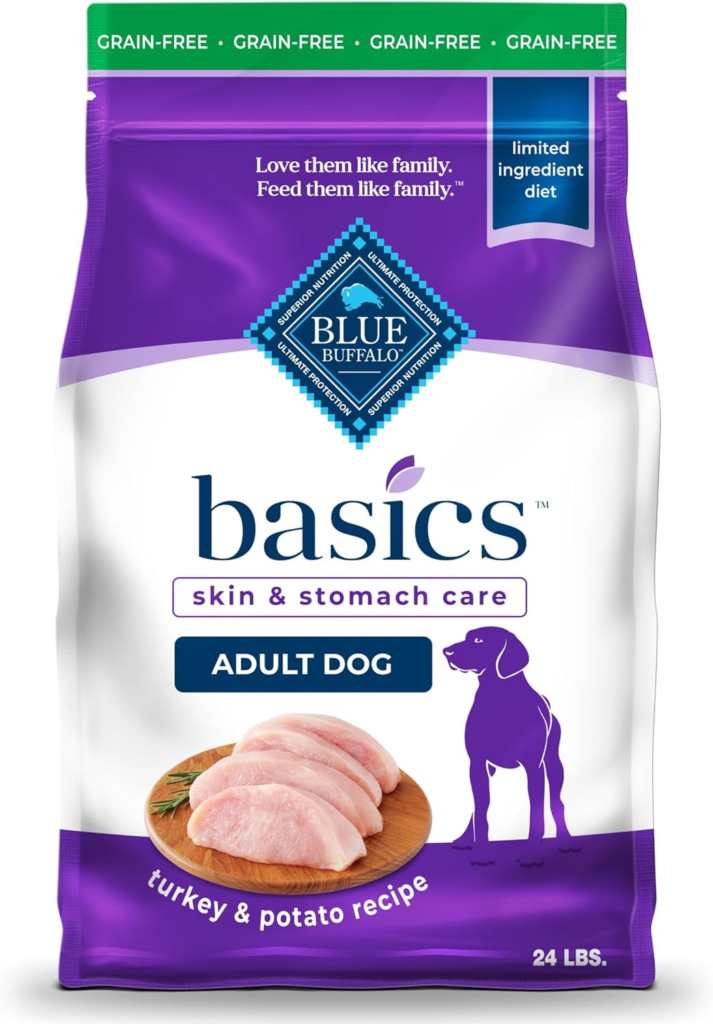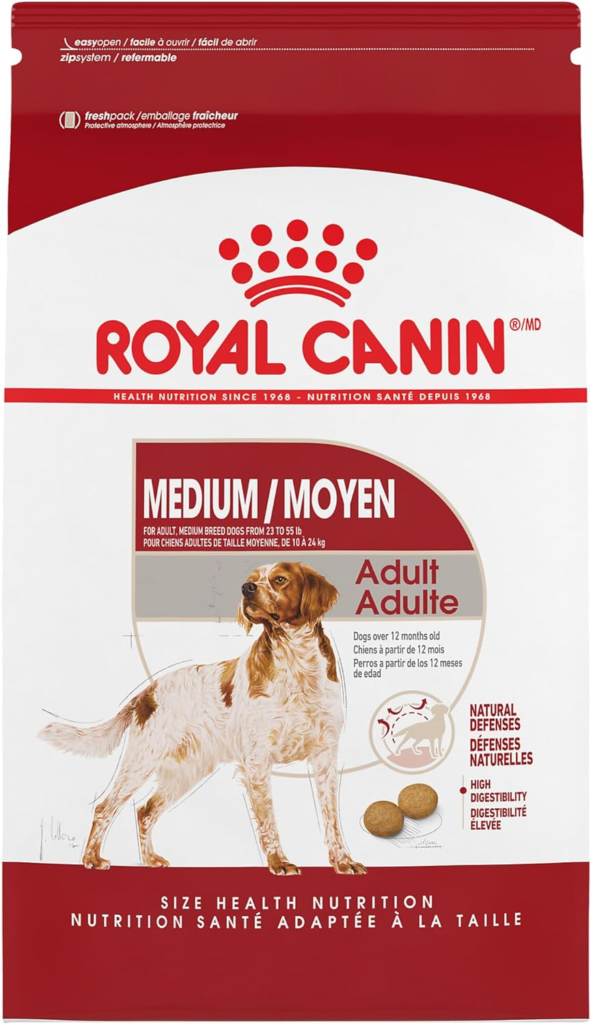Dogs, just like humans, can experience digestive issues that make meal-time a challenge. Digestive discomfort, digestive problems, and even long-term health complications that occur when not properly addressed are among the consequences of dogs’ sensitive stomachs. This guide will discuss some of the causes of sensitive stomach in dogs including the best ingredients to consider for their food; leading brands that produce dog food for sensitive stomachs, homemade recipes and important feeding tips. Understanding these aspects will help you in making informed decisions on your pet’s digestive health and overall well-being.
Also read – Is Wellness a Good Dog Food? A Detailed Review
Common Causes of Sensitive Stomachs in Dogs
Food Allergies and Intolerances
Food allergies and intolerances are some of the primary causes of sensitive stomachs in dogs. Common allergens include meats such as beef, dairy, wheat, eggs, poultry like chicken or turkey, lamb meat, soya beans or soybeans (vegetable protein), pork meat products, rabbits plus fish among others. Unlike intolerances which may cause upset digestion system; allergies often have an immune response associated with them resulting into such symptoms like itchiness on skin , ear infection as well as gastrointestinal disorders.
Poor Quality Ingredients
Low quality dog foods usually contain fillers and artificial preservatives; colours and flavours which may upset a dog’s tummy. In addition to causing inflammation or irritation in the gut corn wheat or soybean ingredients can be difficult to digest.
Rapid Diet Changes
The sudden change of a dog’s diet can shock its digestive system leading to an upset stomach. Therefore, dogs need a gradual introduction to different food stuffs so that their digestive systems can adapt and process the new ingredients efficiently.
Stress and Anxiety
Like humans, stress and anxiety affect digestion in dogs. Environmental change, new family member or changing routines could lead to stress that manifests itself as digestion problems.
Medical Conditions
Certain health conditions such as gastrointestinal diseases, pancreatitis or IBS (irritable bowel syndrome) may cause digestive problems that persist for long in dogs. It is very important to consult a veterinary if your dog consistently shows signs of having indigestion.
Signs of Digestive Issues in Dogs
Prompt identification of the signs of a digestive problem allows for immediate redressal of the same. The various common symptoms are:
- Vomiting
- Diarrhea
- Flatulence
- Constipation
- Loss of appetite
- Weight loss
- Abdominal pain
- Bloating
If any of these symptoms occur persistently in your dog you should contact a veterinarian as soon as possible in order to establish what is causing them and prescribe proper medication.
Best Ingredients for Sensitive Stomachs
Easily Digestible Proteins
Easily digestible proteins like chicken, turkey and lamb can help reduce strain on the digestive tract. Also useful for severe allergies are hydrolyzed protein diets whereby proteins are broken down into smaller molecules.
Probiotics and Prebiotics
Prebiotics help to feed these good bacteria, while probiotics help to maintain a healthy gut flora. These foods are good for digestion and nutrient absorption.
Limited Ingredient Diets (LIDs)
LIDs have few ingredients that can enable the user to identify and do away with potential allergens. Such diets normally consist of one protein source and limited carbohydrate sources.
Grain-Free Formulations
If your pet is sensitive to grains such as corn or wheat, grain-free diets may be more digestible. For carbohydrates, these products feature sweet potatoes or peas instead.
Omega-3 and Omega-6 Fatty Acids
They reduce inflammation in the gut, allowing for a healthier skin and coat. Fish oil, flaxseed and chia seeds are some of their constituents.
Fiber-Rich Ingredients
Soluble and insoluble fiber support healthy digestion by aiding in bowel function. Pumpkin, sweet potatoes, peas among others contain this ingredient.
Top Brands for Sensitive Stomachs
1. Hill’s Science Diet
It provides various formulas which were specifically made for dogs who have got delicate stomachs as well as skins. Hill’s Science Diet Adult Sensitive Stomach & Skin Chicken Recipe is highly recommended because it contains easily-digestible ingredients with balanced nutrition. Shop Hill’s Science Diet on Amazon.com
2. Blue Buffalo Basics
Buffalo Blue Basics Limited Ingredient Diet is best for dogs that are allergic to food. They provide a single protein source and easily digestible carbohydrate in their turkey & potato recipe. Look at the Amazon Explore Blue Buffalo Basics.

3. Purina Pro Plan Sensitive Skin & Stomach
Purina Pro Plan has specialized formulas designed for dogs with sensitive systems. Omega-3 and omega-6 fatty acids rich Purina Pro Formula Salmon & Rice is Prebiotic fiber added to help digestive health. Find Purina pro plan on Amazon.
4. Royal Canin Veterinary Diet
It have personalized nutrition for dogs with specific health needs. Royal Canin Gastrointestinal Low Fat is meant to manage fat digestion problems in dogs with gastrointestinal sensitivities. Check out Royal Canin on Amazon.

5. Wellness Simple
Wellness Simple Limited Ingredient Diet is focused on using few, high-quality ingredients in order to decrease the risk of food sensitivities. Their Salmon & Potato Recipe is one of the most famous meals for those having digestive issues among dogs. Shop Wellness Simple on Amazon.
Homemade Recipes for Sensitive Stomachs
Homemade Chicken and Rice
One chicken and rice constitute a simple, but very effective homemade meal for dogs with sensitive stomachs. It is bland, easy to digest, and helps soothe the digestive system.
Ingredients:
- 1 cup boneless skinless chicken breasts
- 1 cup white rice
- 3 cups water
Instructions:
- Boil the chicken breast until it’s fully cooked.
- Take off from heat the chicken breast then let it cool before shredding into smaller strings.
- Boil the rice in broth until it is cooked.
- Mix chicken and shredded meat with rice.
- Serve in small portions and keep the rest refrigerated.
Pumpkin and Turkey
Turkey gives a lean source of protein, while pumpkin is rich fiber to help regulate digestive system.
Ingredients:
- 1 cup of cooked ground turkey
- 1/2 cup of pure pumpkin (not the pie filling)
- 1/2 cup of brown rice cooked
Instructions:
- Brown the ground turkey in a pan until it has fully cooked.
- Mix with pumpkin and cook rice.
- Cool mixture then serve.
- The leftovers should be stored in a refrigerator.
Sweet Potato and Fish
Fish provides essential omega-3 fatty acids, while sweet potatoes are an excellent source of fiber and vitamins.
Ingredients:
- 1 cup of salmon or whitefish that has been cooked
- 1 ½ cups mashed sweet potato
- ½ cup green beans steamed & chopped
Instructions:
- Fish is cooked and cooled, then flaked into little pieces.
- Mashed sweet potato mixed with flaked fish and chopped green beans hereafter served as a meal all through in small quantity refrigerating the excess part.
Feeding Tips for Dogs with Sensitive Stomachs
Gradual Introduction of New Food
When starting new food, do so gradually over the period 7-10 days introducing it slowly by mixing a small amount of your dog’s current food with new food during this period on each day you will increase how much new food you add relative to what used to be there before; this slow transition helps prevent digestive upset too rarely seen nowadays.
Consistent Feeding Schedule
Regulating your dog’s digestion requires giving him food at the same times every day. Make sure you feed your dog at the same time of day and avoid giving them table scraps or too many treats.
Monitor Portions and Weight
Make sure you feed your dog correctly according to their sizes in relation to their weight and activity levels. Overfeeding may cause digestive problems and obesity while underfeeding results into malnutrition.
Fresh Water Access
Ensure that fresh water is available at all times for optimal digestion and overall health. Dehydration can worsen digestive issues and lead to other health complications.
Avoid High-Fat Foods
Too much fat can be a problem for those dogs with sensitive stomachs High fat foods should not be given to dogs with sensitive stomachs, give them lean proteins instead, do not feed your dog meat with high fat content or greasy snacks.
Benefits of Certain Ingredients
Probiotics
Probiotics are live bacteria which support healthy intestines. These help balance the gut flora and decrease signs of digestive distress like diarrhea, bloating.
Pumpkin
This vegetable is a natural source of dietary fiber which may help normalize digestion in your pets. It is particularly useful for managing both constipation and diarrhea.
Bone Broth
Bone Broth is full of nutrients that are easy on the stomach. It could be used to soothe an upset digestive system as well as provide moisture in addition to important minerals.
Oatmeal
Oatmeal is a mild good carbohydrate which provides roughage that will attend to the gastrointestinal system. It suits dogs with food allergies towards cereals like corn or wheat
How to Gradually Introduce New Food
Step-by-Step Transition
- Days 1-3: Mix 25% of the new food with 75% of the old food.
- Days 4-6: Mix 50% of the new food with 50% of the old food.
- Days 7-9: Mix 75% of the new food with 25% of the old food.
- Day 10: Serve 100% of the new food.
Monitoring Your Dog’s Response
Monitor your dog during this time for any signs such as nausea, changes in appetite, vomiting or diarrhea that may be indicative of digestive upset, and if any problems occur then slow down and consult your vet.
When feeding a dog that has a sensitive stomach, it is necessary to carefully select ingredients, gradually introduce new foods and have consistent feeding practices. Selecting quality commercial pet foods along with following recommendations given in this ultimate guide can ensure good digestion and health in general for your canine pet. See also top rated brands as well as consider homemade formulas; but answer to veterinary doctor who will suggest best diet suitable for your particular animal friend at all times
FAQs
What are the best proteins for dogs with sensitive stomachs?
Kinds of protein that are easy to digest include chicken, turkey, lamb, and fish which usually suit dogs that have sensitive stomachs. Dogs with severe allergies can also benefit from hydrolyzed proteins.
How can I tell if my dog has a food allergy?
Itching, chronic diarrhea, ear infections and gastrointestinal issues are some of the symptoms of food allergies in dogs. Any dog suspected to have this condition must be taken to a veterinary officer to receive diagnosis and treatment.
Is grain-free dog food better for sensitive stomachs?
Grain-free dog food can be useful for dogs with sensitive stomachs sometimes particularly those who have sensitivity towards grains like wheat or corn. However, not all dogs require grain-free diets; veterinarians will advise you accordingly depending on your pet’s needs.
Can homemade dog food help with sensitive stomachs?
When your dog has a sensitive stomach homemade dog food should be prepared specifically for it. Be sure that they provide nutritional balance and also consult your veterinarian about them.
How long does it take for a dog to adjust to new food?
Generally, it takes a period of 7-10 days for a dog to adapt to new food. This avoids any digestive distress by gradually introducing the new diet by adding increasing amounts alongside the old one.
